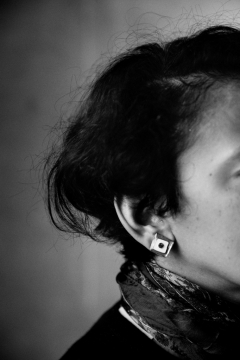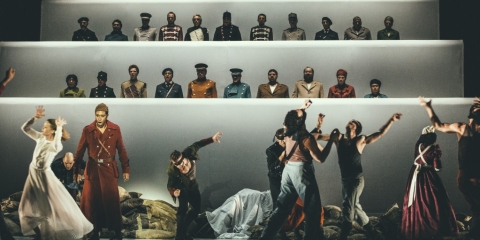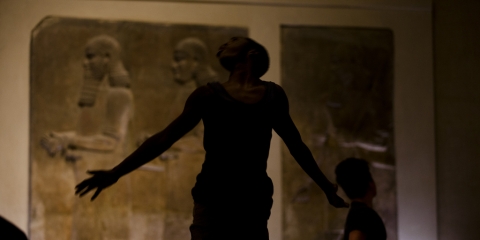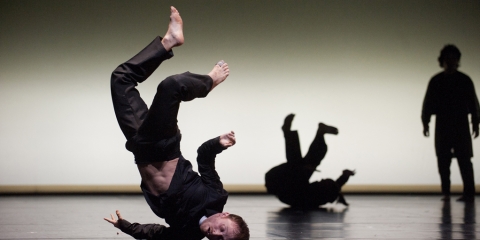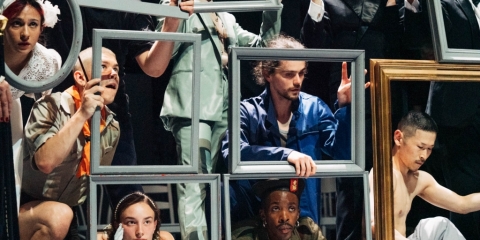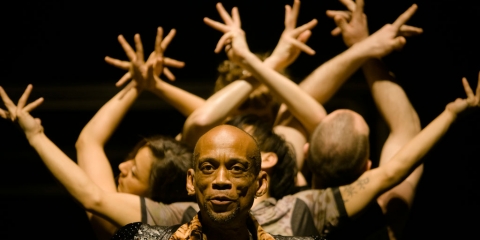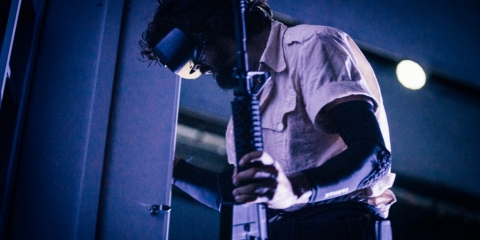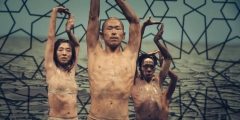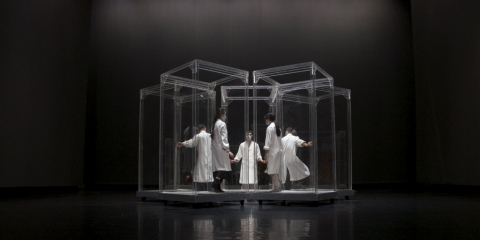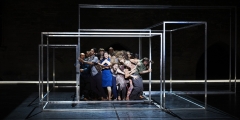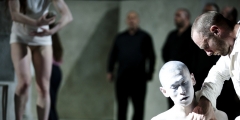/
Karthika Naïr
French-Indian, poet, playwright, fabulist and co-founder of Eastman, Karthika Naïr often wryly adopts the term portmanteau-person to describe herself, especially within Larbi-land, where she has occupied functions ranging from producer to speechwriter to prospector for ghungroos and katana (and toilet paper), sometimes within the space of the same day.
Outside this fantastical territory, where shape-shifting is a necessary skill, you’ll find her navigating her way around hospitals (thanks to RDEB inversa, a congenital disorder, most of her days are spent in the land of illness) or trying to meet writing deadlines. Sometimes, that can result in books, or dance/theatre productions. Sometimes, both…
Until the Lions: Echoes from the Mahabharata, her reworking of the foundational South Asian epic in multiple voices, won the 2015 Tata Literature Live Award for Book of the Year (India), and was highly commended at the 2016 Forward Prizes (UK). Les Oiseaux électriques de Pothakudi (Éditions Hélium/Actes-Sud, 2022) – her latest children’s book illustrated by Joëlle Jolivet – won the 2023 Prix Felipé for “ecological children’s literature”, and is shortlisted for the 2023 Jugendliteraturpreis, the Franco-German award for children’s literature.
Naïr’s play Beneath the Music, created and directed by Jay Emmanuel for Encounter Theatre, premiered at the Subiaco Arts Centre in Perth in May 2023. The dance performances she has scripted and co-scripted have been staged in prestigious venues across the world. Among them number three of Akram Khan Company’s productions: the multiple-award-winning DESH, its family-audience version Chotto Desh (both of whose central sequences stage her children’s story The Honey Hunter) as well as Until the Lions (adapted from a chapter of her eponymous book). Eva Kleinitz – the late director of Opéra national du Rhin and longstanding champion of dance – commissioned a dance-opera adaptation of Until the Lions, which finally premiered in September 2022. Naïr’s scripted retellings include Carlos Pons Guerra’s Mariposa, a queer reimagining of Puccini’s opera Madame Butterfly.
Sidi Larbi Cherkaoui’s collaboration with Karthika Naïr began shortly after they met in 2005 during a zero degrees tour at Théâtre de la Ville, Paris, a time when he was exploring material around Alexander Pushkin's narrative poem The Gypsies for the forthcoming duo Aleko that he would choreograph with Damien Jalet.
When Naïr moved to the Musée national de l'histoire de l'immigration in 2006 to head the department of programming & production, Cherkaoui was the first choreographer that she and her artistic director, Patrice Martinet, invited to create a site-responsive work. This monumental, 3-dimensional, video installation, La Zon-Mai (reverse-slang for “home” in French) that Cherkaoui co-directed and conceptualised with visual artist Gilles Delmas, features twenty-one dancers, mostly first or second-generation immigrants, performing in bedrooms, kitchens, even bathrooms and hallways. La Zon-Mai is now part of France’s national collection of contemporary art, and it still tours around the world, gently questioning our notions of home and belonging, private and performance space, displacement and movement.
In 2007, Naïr joined Het Toneelhuis to manage Sidi Larbi's projects, working on a myriad of pieces from Apocrifu and Sutra to Orbo Novo and Interconnexions. Meanwhile, together with Frederic Verrote and Cherkaoui himself, she prepared the creation of Eastman as an enduring home for Sidi Larbi's projects and aspirations.
Despite year-long stints away from Eastman from time to time, she has been a steadfast part of the company in various capacities since its inception, whether as executive producer of the award-winning Babel(words) and Puz/zle, Damien Jalet's Three Spells and the site-specific Les Médusés for the Louvre Museum, or – since 2016 – as artistic advisor.
Between 2010 and 2015, Naïr seconded Sidi Larbi Cherkaoui as associate programmer of Festival Equilibrio in Rome. In 2012, she blueprinted the biannual Prakriti Excellence in Contemporary Dance Awards (PECDA) for Prakriti Foundation in India, a unique initiative for dance in the Subcontinent, and she remained its artistic director across four biannual editions before handing the baton over to Chandrika Grover and Farooq Chaudhry in 2018.
These days, you’ll find her scouting for new dance pieces as one of the global nominators of the Rose International Dance Prize, a new initiative organised by Sadler’s Wells Theatre.
